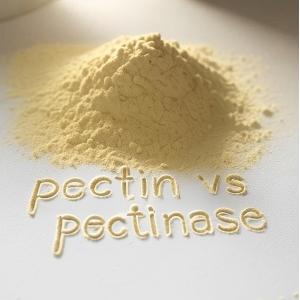Are pectin and pectinase the same

Pectin and pectinase are often mentioned together, especially in food processing and biotechnology, which can lead to confusion about whether they are the same. Despite their similar names, they are fundamentally different in nature, structure, and function.
What is Pectin? What is pectinase?
Pectin is a natural polysaccharide found in the cell walls of fruits and vegetables, particularly citrus peels and apple pomace. It acts as a structural component, providing firmness and stability to plant tissues. In the food industry, pectin is widely used as a gelling agent in jams, jellies, and fruit-based products.
Pectinase, on the other hand, is an enzyme or a group of enzymes that break down pectin. It is produced by fungi, bacteria, and some plants and is used to degrade the complex structure of pectin into simpler molecules. This enzyme plays a critical role in juice clarification, wine production, and improving the extraction of fruit pulps and oils.
The main difference lies in their roles: pectin is a substance, while pectinase is a catalyst that breaks down that substance. Without pectin, pectinase would have no substrate to act upon, and without pectinase, pectin would remain in its complex, gel-forming structure.
In industrial applications, the use of pectinase helps reduce viscosity, enhance clarity, and increase yield in processes involving pectin-rich materials. It’s also used in textile processing, paper production, and environmental biotechnology due to its ability to break down plant-based materials efficiently.
Are pectin and pectinase the same. In summary, pectin and pectinase are not the same. Pectin is a structural carbohydrate, while pectinase is the enzyme that targets and breaks it down. Understanding this distinction is important for those working in food science, fermentation, and agricultural biotechnology.
